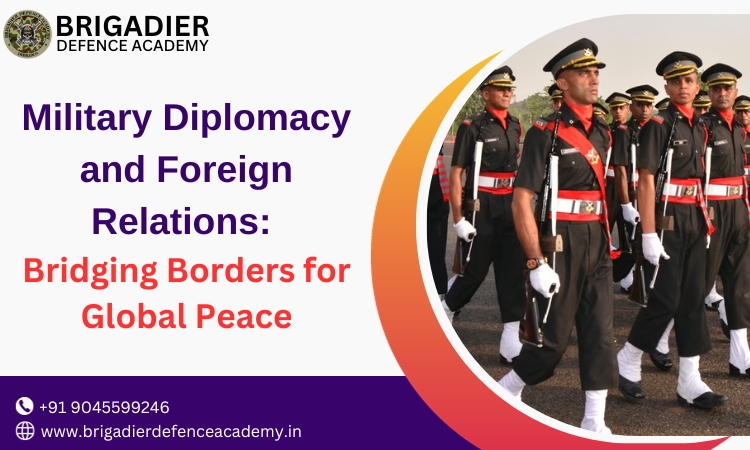Introduction
In a world characterized by geopolitical complexities, military diplomacy and foreign relations play an integral role in shaping nations’ interactions, securing peace, and advancing mutual interests. As we delve into this intriguing subject, we’ll explore the significance, historical context, and contemporary relevance of military diplomacy and foreign relations.
Understanding Military Diplomacy and Foreign Relations
Military Diplomacy: Military diplomacy refers to the use of armed forces in diplomatic strategies and negotiations to achieve foreign policy goals. It involves both overt and covert military interactions with other nations, aimed at enhancing security, fostering cooperation, and mitigating conflicts.
Foreign Relations: Foreign relations encompass a nation’s interactions with other countries on the global stage. These interactions encompass a wide array of political, economic, social, and military exchanges, all of which contribute to a nation’s position in the international community.
Historical Roots
Military diplomacy and foreign relations are deeply rooted in history. Throughout the ages, nations have relied on diplomatic strategies that leverage their military capabilities to advance their interests. Some key historical instances of military diplomacy and foreign relations include:
The Cold War
The Cold War, a protracted period of tension between the United States and the Soviet Union, is a prime example of military diplomacy. Both superpowers engaged in a nuclear arms race while simultaneously seeking opportunities for diplomatic engagement, such as arms control negotiations and detente.
The Balance of Power
In the 19th century, the concept of the balance of power was prevalent in European diplomacy. Nations sought to maintain equilibrium by forming alliances and adjusting military capabilities to prevent any one nation from dominating the continent.
Colonial Expansion
European colonial powers used military diplomacy to establish colonies and exert control over foreign lands. Often, military force was employed in negotiations with indigenous populations and other colonial powers.
The Modern Landscape
In today’s world, military diplomacy and foreign relations have evolved to address new challenges and opportunities.
Preventing Armed Conflicts
One of the key roles of military diplomacy is to prevent armed conflicts. Nations engage in dialogues and negotiations to ease tensions, avert potential crises, and find diplomatic solutions to disputes. This approach has played a pivotal role in reducing the likelihood of large-scale wars.
Peacekeeping Missions
Military diplomacy is also demonstrated through peacekeeping missions. International organizations like the United Nations deploy troops to conflict zones to mediate and maintain peace. These missions provide an opportunity for military forces to engage in diplomacy while working towards stability and security.
Counterterrorism Cooperation
In an age of global terrorism, military diplomacy and foreign relations have taken on an anti-terrorism dimension. Nations collaborate on counterterrorism strategies, share intelligence, and conduct joint military operations to combat extremist groups.
Humanitarian Assistance
Foreign relations extend beyond traditional military cooperation. Countries often provide humanitarian assistance in the form of disaster relief, medical aid, and development projects, which can significantly influence their image and relationships with other nations.
The Role of Military Diplomats
Military diplomats play a vital role in bridging the gap between the military and diplomatic realms. They are often assigned to embassies and consulates to facilitate communication between military leaders and foreign governments. Military diplomats negotiate agreements, conduct joint military exercises, and participate in international forums to address global challenges.
Foreign Relations on the Global Stage
Foreign relations are integral to a nation’s identity and standing in the international community. Countries strive to maintain diplomatic relations with a multitude of nations to secure their interests, foster economic cooperation, and promote cultural exchanges.
Trade and Economic Relations
Economic relations are a significant aspect of foreign relations. Nations engage in trade agreements, investment partnerships, and economic cooperation to enhance their economic well-being. These relationships often influence a nation’s foreign policy.
Cultural Exchanges
Cultural diplomacy fosters mutual understanding and appreciation among nations. It involves cultural exchanges, educational programs, and international events that showcase a nation’s heritage and values.
International Organizations
Nations often join international organizations like the United Nations, NATO, or the World Trade Organization to participate in global decision-making processes and address common challenges. These organizations provide platforms for diplomacy and cooperation.
Bilateral and Multilateral Agreements
Foreign relations encompass bilateral agreements between two nations and multilateral agreements involving multiple countries. These agreements can cover various aspects, such as security, trade, environmental protection, and human rights.
Military Diplomacy and Foreign Relations in Practice
The synergy between military diplomacy and foreign relations can be seen in various real-world scenarios:
NATO and Collective Defense
The North Atlantic Treaty Organization (NATO) is a prime example of military diplomacy in action. Member states commit to mutual defense, pledging to come to each other’s aid in the event of an attack. This alliance serves both military and diplomatic purposes by enhancing security while strengthening international cooperation.
Joint Military Exercises
Countries engage in joint military exercises, enhancing military readiness while also fostering diplomatic relationships. These exercises demonstrate military capabilities and promote cooperation among nations.
Peace Talks
Diplomacy plays a pivotal role in resolving conflicts, as seen in peace talks between nations engaged in disputes. These negotiations aim to find common ground and end hostilities, demonstrating the diplomatic aspect of military conflicts.
Counterterrorism Alliances
In the fight against global terrorism, countries form alliances and coalitions to share intelligence, conduct military operations, and combat extremist threats. These efforts exemplify the marriage of military and diplomatic strategies.
Challenges and Controversies
While military diplomacy and foreign relations offer substantial benefits, they also come with challenges and controversies. These include:
Sovereignty Concerns
Nations may be hesitant to engage in military diplomacy, fearing that it compromises their sovereignty or subjects them to external influence.
Arms Control and Non-Proliferation
Negotiating international agreements on arms control and nuclear non-proliferation can be complex, as nations seek to balance their security interests with global stability.
Human Rights and Ethics
The pursuit of diplomatic relations with nations that have poor human rights records or engage in unethical practices can raise moral and ethical dilemmas.
Proxy Wars
Proxy wars, where nations support opposing factions in a conflict, can further complicate foreign relations and military diplomacy.
Conclusion
Military diplomacy and foreign relations are dynamic and multifaceted aspects of international politics. These mechanisms have been pivotal in preventing armed conflicts, maintaining peace, and fostering cooperation among nations. While challenges exist, the potential for dialogue and diplomacy to address global issues remains paramount. As we navigate the complex web of international relations, the intersection of military and diplomatic strategies continues to shape our world, providing hope for a more peaceful and prosperous future.
NOTE: Click Here, for Sarkari Naukri Latest Jobs Online Form at Sarkari Results 2023







